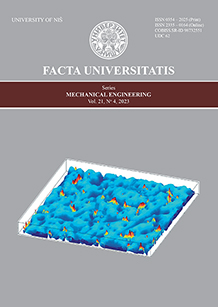社会人口因素对波斯尼亚和黑塞哥维那西部初级保健机构2型糖尿病患者依从性的影响
IF 11.8
2区 工程技术
Q1 ENGINEERING, MECHANICAL
引用次数: 0
摘要
糖尿病,包括2型糖尿病,是一个全球性的健康问题,只有不到50%的人能达到最佳的血糖控制。斯普斯卡共和国Krupa na Uni健康中心的一项研究评估了2019-2020年期间159名2型糖尿病成人患者的依从性。本研究采用了一份普通问卷和一份特殊问卷——慢性疾病依从性量表。结果显示,72.9%的患者有中度依从性,16.4%的患者有低依从性,只有10.7%的患者有高依从性。女性预测更高的依从性(p=0.048)。口服降糖药的类型(p=0.520)与依从性无关。年龄较大(p=0.316)和教育程度较低(p=0.182)与依从性较低相关,但不显著。60岁以上的年龄和受教育程度对依从性没有显著影响。虽然差异无统计学意义,但在职被调查者(p=0.076)和农村被调查者的依从性水平更高(p=0.064)。一些受访者根据他们的身体需求和信仰服用药物,这表明需要解决影响依从性的信念和行为。依从性差仍然是一个重大问题,解决依从性障碍,特别是与性别有关的障碍,可以改善2型糖尿病患者的健康结果。正在进行的研究和干预措施对于提高2型糖尿病患者的依从率和健康结果至关重要。本文章由计算机程序翻译,如有差异,请以英文原文为准。
INFLUENCE OF SOCIO-DEMOGRAPHIC FACTORS ON ADHERENCE OF PATIENTS WITH TYPE 2 DIABETES IN A PRIMARY HEALTHCARE SETTING IN WESTERN BOSNIA AND HERCEGOVINA
Diabetes mellitus, including type 2 diabetes, is a global health issue with less than 50% of individuals achieving optimal glycemic control. A study at Health Center Krupa na Uni, Republic Srpska, assessed adherence in 159 adults with type 2 diabetes, during the study conducted during 2019-2020. The research used a general and specific questionnaire The Adherence in Chronic Diseases Scale. Findings showed 72.9% had moderate adherence, 16.4% had low adherence, and only 10.7% had high adherence. The female gender predicted higher adherence (p=0.048). The type of oral hypoglycemic agents (p=0.520) was not associated with adherence. Older age (p=0.316) and lower education level (p=0.182) were associated with lower adherence, but not significantly. Age over 60 years and level of education had no significant effects on adherence. Although there was no statistical significance, employed respondents (p=0.076) and those living in rural areas had a higher level of adherence (p=0.064). Some respondents took medications based on their physical needs and beliefs, indicating the need to address beliefs and behaviors influencing adherence. Poor adherence remains a significant issue, and addressing adherence barriers, particularly those related to gender, can improve health outcomes for individuals with type 2 diabetes. Ongoing research and interventions are crucial to improve adherence rates and health outcomes in individuals with type 2 diabetes.
求助全文
通过发布文献求助,成功后即可免费获取论文全文。
去求助
来源期刊

Facta Universitatis-Series Mechanical Engineering
ENGINEERING, MECHANICAL-
CiteScore
14.40
自引率
2.50%
发文量
12
审稿时长
6 weeks
期刊介绍:
Facta Universitatis, Series: Mechanical Engineering (FU Mech Eng) is an open-access, peer-reviewed international journal published by the University of Niš in the Republic of Serbia. It publishes high-quality, refereed papers three times a year, encompassing original theoretical and/or practice-oriented research as well as extended versions of previously published conference papers. The journal's scope covers the entire spectrum of Mechanical Engineering. Papers undergo rigorous peer review to ensure originality, relevance, and readability, maintaining high publication standards while offering a timely, comprehensive, and balanced review process.
 求助内容:
求助内容: 应助结果提醒方式:
应助结果提醒方式:


